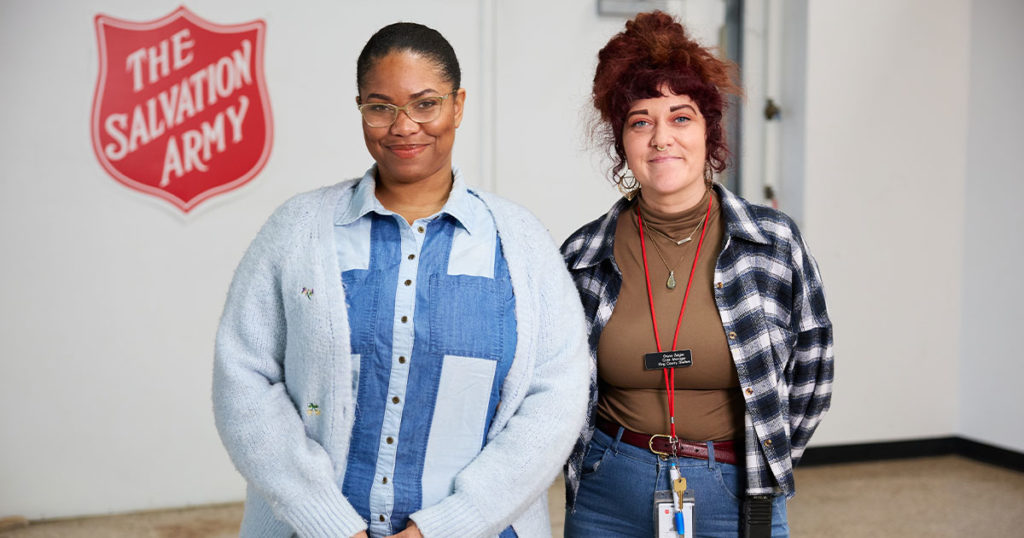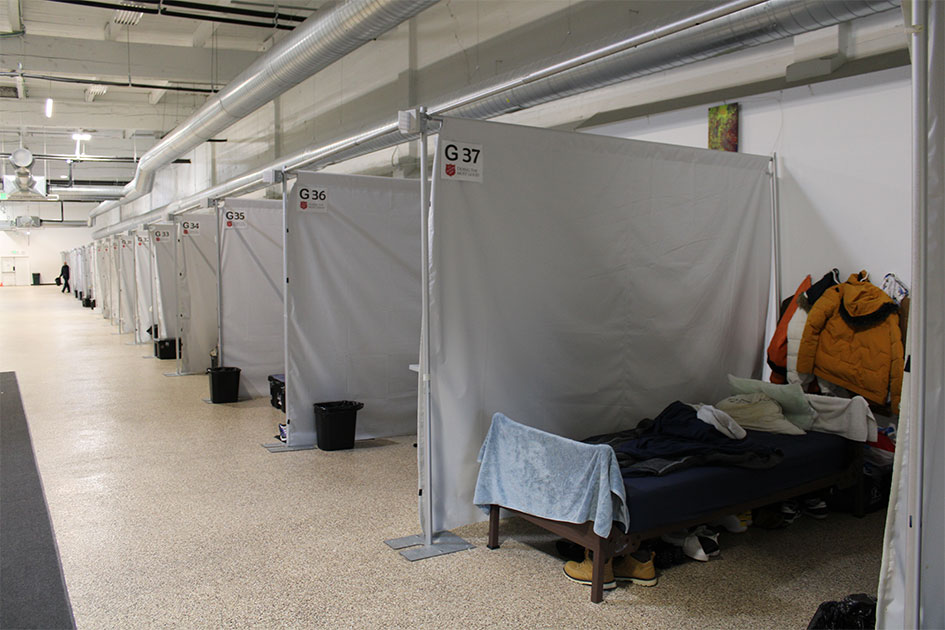Former Tesla Facility Becomes A Salvation Army Homeless Shelter
“The goal is to begin conversations, to make an invitation to be a part of a program, to be a part of church, to invite people to know Christ.”
One of the newest and largest Salvation Army homeless shelters in the Northwest Division opened during the COVID-19 pandemic in the SoDo (South of Downtown) neighborhood of Seattle. People with nowhere to go can turn to the SoDo shelter, where they can find a bed, a shower and three meals a day. They can also expect ongoing support, whether it’s just talking about their day or assistance getting permanent housing, a new ID and more.
Such services are typical in a Salvation Army shelter. So, what sets the SoDo shelter apart? For one thing, it used to be a Tesla facility before the pandemic. When Tesla let go of the warehouse, it was going to be used as a quarantine overflow site, but was never used for that purpose. The facility was ultimately leased to King County, which then contracted The Salvation Army to run operations in the facility. Designed as an ICU field hospital with the accompanying hospital-grade ventilation, semi-private rooms and bathrooms, it far exceeds shelter facility standards.
However, the SoDo shelter is also unique in the experience it can offer its residents. It follows what’s known as an “enhanced shelter model,” meaning that it addresses the issues that keep people on the streets and out of shelters. “They want privacy, they want to bring their pets, their people, and their possessions. An enhanced model addresses all these,” says Lt. Colonel Cindy Foley, Divisional Commander in the Northwest Division. “Those issues are the main reasons people won’t come in.”
SoDo shelter addresses “the four p’s” (privacy, pets, people and possessions) in part by ensuring shelter residents have a place to call their own. “Each resident is provided with a semi-private space with their own bed, their own desk, their own chair,” says Garrett Sherman, director of King County Shelters. The three-walled rooms offer clients an “off-the-charts high” level of dignity, and they’re encouraged to personalize their space. It’s not uncommon to see someone’s room decked out in Seahawks gear.
There’s a sense of privacy and respect that comes with the rooms allotted to shelter residents. They’re separated from their neighbors, while still being open enough to prevent illicit activities. But Sherman also emphasized how community bonds are formed at the shelter. “The community aspect really allows for it to come together. People are going to have that community feeling so that they are comfortable with not only trying to advance in their own lives, but help others too, which I believe is key. We’re not in this alone and we shouldn’t be.”
Shelter guests have responded positively to all the support. “Folks arrive and they are, for lack of a better term, blown away by the support they receive,” says Sky Caldwell, assistant director of King County Shelters. “We get comments all the time [about] how clean our shelter is, what we have in our programs from client services to direct support from our shelter staff … And then folks that have had no expectations or ever thought that they could get their own apartment. There are no words for seeing their [reaction] and their emotion. It’s just incredible.”
“The goal is to begin conversations, to make an invitation to be a part of a program, to be a part of church, to invite people to know Christ.”
There are no “cookie-cutter” methods to supporting residents at a shelter, and the personalized approach is part of what makes the SoDo shelter so effective. That was clearly evident for SoDo shelter guest Destini McCullough. She arrived at the shelter in December 2023 after a falling out with her family. “I took a leap of faith and moved to California, but I didn’t have sufficient resources to start my life over,” says Destini. Her time at the SoDo shelter allowed Destini to focus on her future and maintain her emotional, financial, and spiritual stability before she secures permanent housing.
“I’ve had to become comfortable acknowledging that I am homeless, getting rid of my pride and saying ‘I do need help.’ God has given me an abundance of time for ‘trial and error’ as I discover my purpose,” says Destini. “When you are here [at SoDo shelter], you get the peace of mind that God gets to take time working on you.”

SoDo case manager Giana Zeigler has walked alongside Destini in her self-discovery journey, helping her apply to Seattle Central College, receive tuition assistance, seek employment opportunities, volunteer, and keep her accountable to achieve her goals. “I check in with her every day and offer her the space to vent, share ideas, and ask questions. I’ve seen her confidence and independence continue to grow,” said Giana. “I want to help her have a clear vision for her future and cultivate her growth.”
“Giana has been incredibly beneficial to help me through my struggles. She attunes to who I am, while keeping me tethered to the ground. I don’t know what I would do without Giana,” said Destini. Destini pursued an accounting career and landed a seasonal job; however, she has shifted her focus to medical technology with aspirations to become a neurosurgeon. “Just to be in a position where I have goals that are outside of solely survival … I am incredibly blessed that good things are possible for me. I wake up every day and have a fresh start. I ask myself: ‘Who can I become today?’”
The staff and leadership of the SoDo shelter want to ensure that they can continue offering support to people like Destini. Sherman also emphasized the need for increased funding in order for the shelter to continue to function and to allow for growth to address the issues that aren’t going away anytime soon. It’s clear that if the SoDo shelter were to cease operations, the community would feel strongly about it.
Demand for space in the shelter is consistently high. “We’re always full. There’s a waiting list,” Lt. Col. Foley laments. That’s true of most shelters, which can always use more support, and it doesn’t have to be financial support. Volunteers are also frequently in short supply. To find out more about the fight to end homelessness and how you can get involved, contact your local Salvation Army today.
Support the mission
Donations to support the work of The Salvation Army can be made online at salvationarmyusa.org
This article was originally titled “Sheltered in Seattle” in the July 2025 issue of The War Cry.







